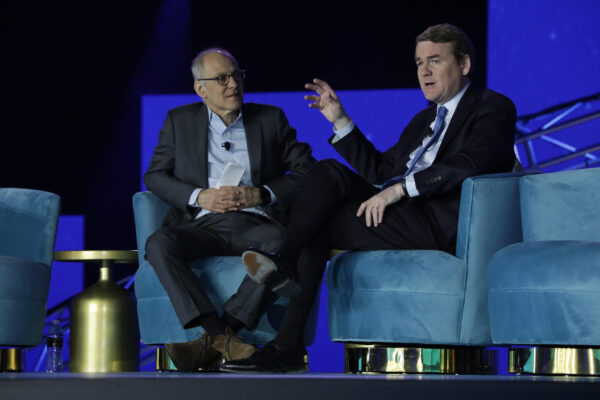
Ezekiel Emanuel interviews Democratic Presidential Candidate Micheal Bennet at the HLTH conference on Wednesday in Las Vegas.
Colorado Senator and 2020 Democratic Presidential Candidate Michael Bennet was at the second annual HLTH conference in Las Vegas on Wednesday in a session designed around issues in healthcare.
Bennet spoke about Medicare for All, which he believes is doomed to fail, while also explaining that the overarching goal is to get to universal healthcare at the lowest price and the highest quality. He was being interviewed by Ezekiel Emanuel, vice provost for global initiatives at the University of Pennsylvania and chair of the Department of Medical Ethics and Health Policy.
Emanuel asked Bennet about how he would tackle the issue of surprise medical billing, where patients receive a bill for a procedure or test which they believed was covered by insurance. It can happen when during an emergency, the patient gets taken to a hospital that is out of network or is seen by an out-of-network physician.
And given that the Colorado senator is a sponsor of a bill to end this practice that often leads to financial hardships, Emanuel asked him to describe what that might look like.
This is how Bennet responded:
The nature of the problem is that a sixth of the people, according to Kaiser, that shows up to an emergency room end up with an out of network bill. ANd a sixth of people that have a hospital stay ends with an out of network bill. The journalists in Colorado were so interested in this piece of legislation that the way they find people who’ve had this happened to them is that they look for liens that are reported publicly of people that have lost their houses as a result of surprise medical bill.
This is not only not a nontrivial issue. It’s a huge issue for the American people and it has attracted bipartisan support. So, you got the senator from Louisiana who is on this with me, Bill Cassidy, and a number of others.
The way that our bill is beginning to take shape is and what we’ve said to patients is that if you are out of network in an emergency or you are in-network but you’ve got an out-of-network physician, you pay what you bargained for when you bought your insurance plan.
And then the doctor gets reimbursed at the median rate in the community where he is doing his work. Our bill allows for arbitration if the doctor feels like they’ve been unfairly treated and we will certainly negotiate what that would look like. But to the extent that we’re all in this together and we do have to find a solution to this problem. The burden is falling on individuals in ways that are destroying their lives.
Bennet’s partner on the STOP Surprise Medical Bills bill in Congress is Bill Cassidy (R-Louisiana) but the bipartisan bill has also garnered support from others well. In a Sep. 21 op-ed, Bennet wrote that the bill has 27 Republican and Democratic co-sponsors.
At HLTH, Emanuel pressed Bennet on whether he felt the private equity industry is behind this “pernicious practice” of surprise medical billing. While Bennet answered that “you’re probably right” he said the “broader question we should be asking is what are we trying to do as a country to incentivize the outcomes we want in healthcare.”
Photo: HLTH








